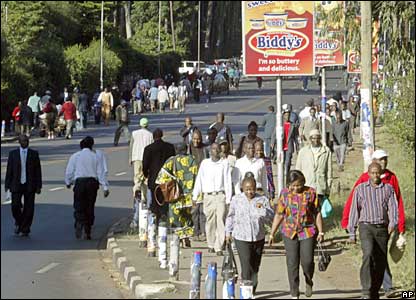Only a paltry four per cent of Kenyans actively invest in the Nairobi stock market according to a new study.
The Oxford Business Group study has blamed the slow uptake of Nairobi Securities Exchange (NSE) products on lack of awareness.
However, the NSE and the Capital Markets Authority (CMA) believe the situation will change soon with the planned equities awareness campaign and roll out of diversified products.
DERIVATIVES MARKET
“There is great demand and appetite for the derivatives market in Kenya, from both investors and market participants,” said NSE Managing Director Mr Geoffrey Odundo.
Mr Odundo added: “Derivatives will not only offer a wider range of investment channels, but also give individuals, corporates and farmers a view of the future prices of currencies, interest rates, minerals and agricultural products. We believe this market will revolutionise Kenya’s capital markets industry.”
According to Mr Jimnah Mbaru, Chairman of Dyer and Blair, more Kenyans are getting involved in the securities market.
“Until recently, about 70 per cent of stock market turnover was generated by foreign investors, but this has since declined to around 60 per cent,” Mr Mbaru said.
MANUFACTURING BASE
While attributing the slow growth of the equities market to the country’s low manufacturing base, Mr Mbaru said Kenya needs to focus on developing its manufacturing and industrial sectors, as these are the prime candidates for long-term capital secured by way of the markets.
“Currently only around 12 per cent of GDP comes from manufacturing. This is not enough to support equity market growth,” said Mr Mbaru.
The NSE and CMA have in the recent past exuded confidence that the introduction of new products and tools aimed at boosting liquidity may help Kenya support growth of its capital markets during a period of broader emerging market volatility.
One such investment vehicle is the exchange-traded funds (ETF) segment, which is due to be launched before the end of the year.
Other initiatives include a new securities settlement platform, expected to go live in the next few months, which will feature functionalities such as same-day trading, settlement services for government securities, and securities lending and borrowing to facilitate short-selling and other investment strategies.
The country also plans to launch a derivatives market in the fourth quarter, which will make the NSE the second bourse in sub-Saharan Africa after Johannesburg to offer such instruments.
Initial offerings on the long-awaited market will focus on agriculture and mineral products, followed by mining and power.
CMA and NSE are also looking to raise the number of companies traded on the bourse by encouraging additional listings on the Growth Enterprise Market Segment (GEMS), an alternative board consisting of small and medium-sized enterprises (SMEs).
Only four companies have listed since GEMS was launched two years ago.








